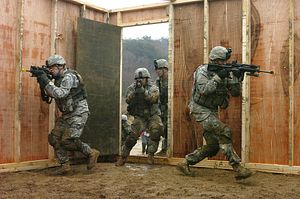United States and South Korean troops kicked off the 2017 iteration of their large-scale annual Foal Eagle exercises on Wednesday.
The exercises will run through April and will overlap with the Key Resolve exercise, which begins later this month, on March 13.
The exercises come amid high tensions between the U.S.-South Korea alliance and North Korea, which conducted its first ballistic missile test of 2017 in February.
Last year, North Korea vehemently protested the Foal Eagle-Key Resolve exercises in the spring, arguing that the drills served as a rehearsal for a preemptive strike by the U.S.-South Korea alliance.
In 2016, North Korea carried out 24 ballistic missile tests and two nuclear tests, both of which it claimed tested thermonuclear devices.
Last year’s Foal Eagle was the largest ever between the two allies, with 290,000 South Korean troops and 15,000 U.S. troops participating.
The alliance normally stages large-scale landing operations biennially, but will repeat the drills this year amid sharper tensions with North Korea.
Moreover, on Wednesday, U.S. Defense Secretary Jim Mattis spoke to his South Korean counterpart Han Min-koo on the phone.
According to a readout of the call by U.S. Forces Korea, Mattis said the U.S. “remains steadfast in its commitment to the defense of the (Republic of Korea).”
Mattis “further emphasized that any attack on the United States or its allies will be defeated, and any use of nuclear weapons will be met with a response that is effective and overwhelming.”
The U.S. defense secretary additionally welcomed the recent formal land transfer of a golf course from the private South Korean conglomerate, the Lotte Group, to the South Korean government.
The land will be used to station the first Terminal High-Altitude Area Defense (THAAD) battery in South Korea to protect against ballistic missile attacks from North Korea.
China has long protested the joint U.S.-South Korea decision to deploy the battery, which it claims negatively affects its security interests.

































